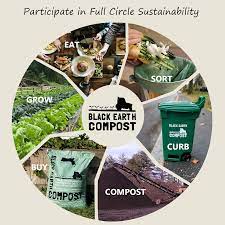 |  |
One of the major existential crises we face today is climate change. Whether this is a manmade issue or a global cyclical issue, greenhouse gas emissions are a substantial contributing factor to the warming of the planet. Scientists today are realizing that the predictions of this global warming trend have a much shorter time line than originally thought and unless we figure out how to produce fewer greenhouse gasses and recapture them resulting in lowering their concentration in our atmosphere there will be catastrophic results to our climate, food and water availability and sea level changes. In response to these issues, the Manchester-Essex Rotary club has submitted a grant to support the Black Earth Composting project.
One of the ways we can contribute to the solutions of this complex issue is composting. Compost reverses global warming through deep carbon storage, AND reinvigorates our ability to grow food. A major challenge being in MA, a vast amount of food we eat comes from outside New England. So we are net importers of nutrients, and it is not cost effective to ship compost out of the area. Compost is a nice carbon sink, it stores carbon long term in the soil, it pulls CO2 out of the air, so it has a net negative impact on the emissions. It’s just the simplest thing people can do right now to have an impact on solving this problem.
Black Earth Compost is a local company from Gloucester that has a green solution for the overwhelming trash problem in Massachusetts which contributes in a positive way to this problem. Massachusetts recognized there is a large problem looming, because there are no new landfills or no new incinerators opening, so in 2014 they but a ban on food scraps going to those facilities. With that ban in place, curbside composting is taking off putting food scraps back to work by bringing nutrients back into our local soil and by trapping greenhouse gasses . Their mission is to get communities committed to composting by providing the compost pick up storage and processing of food scraps from local households and businesses in eastern Massachusetts and delivering it back into the communities for their landscape and gardening needs. Their proof of concept is their first permanent composting facility being constructed at the Manchester by the Sea transfer station on Pine Street. It’s a full circle in sustainability, as customers get a bag of compost in return from their weekly scraps. If used in landscapes and the gardens, people can take a small step in fighting climate change.
The Club is proposing to donate funds to Seaside Sustainability, a 501 C3 corporation who is the fiscal agent for fund raising on the Black Earth project. $1,000 of the funds will be used to purchase compost bags, totes, promotional content, etc. which we will give to the community to bolster educational efforts and the $5,000 for some of the construction costs for the composting facility. They will be partnering with the Manchester DPW, The Manchester School System Green team and the Manchester Sustainability committee in organizing and providing events to educate people about composting and its impact on our local communities.

.png)
